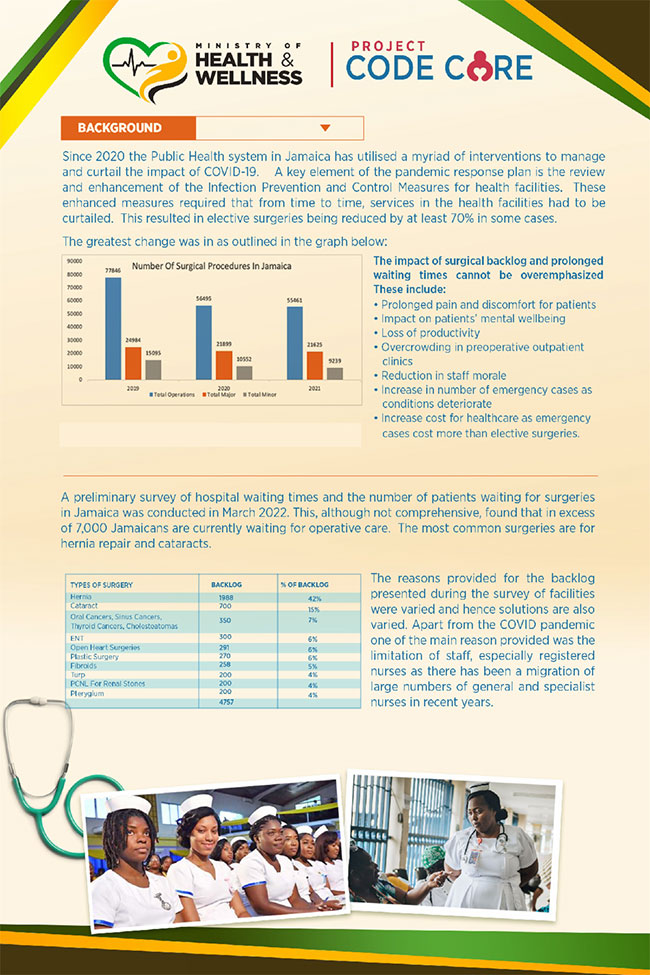JAMAICA | Health Minister targets medical personnel in the diaspora to clear surgical backlog

KINGSTON, Jamaica, June 22, 2022 - Health and Wellness Minister Dr Christopher Tufton, is now in the United States seeking to recruit Jamaican nurses, doctors and other medical personnel as part of his Code Care Programme which he says will help to clear the elective surgery backlog in the island’s hospitals.
During his contribution to the sectoral debate in May, Tufton noted that since March 2020, many hospitals have had to suspend normal processing of elective surgeries, which has resulted in the extension of the length of time that persons have to wait for these operations, sometimes up to two years.
A promotional flier from the Ministry says it is seeking to recruit medical staff for its CODE CARE programme, which is a project to improve wait times for elective surgeries such as cataracts as well as oral and sinus cancers.
 “The reasons provided for the backlog presented during a survey of facilities were varied and hence solutions are also varied.
“The reasons provided for the backlog presented during a survey of facilities were varied and hence solutions are also varied.
Apart from the COVID pandemic one of the main reasons provided was the limitation of staff, especially registered nurses as there has been a migration of large numbers of general and specialist nurses in recent years,” the promotional flier said.
“A preliminary survey of hospital waiting times and the number of patients waiting for surgeries in Jamaica was conducted in March 2022.
This, although not comprehensive, found that in excess of 7,000 Jamaicans are currently waiting for operative care. The most common surgeries are for hernia repair and cataracts,” it continued.
The health ministry says the CODE CARE programme was introduced to ease that stress, with the intended engagement of specialist nurses and support staff in the form of nursing missions to support the local nursing cadre for between seven and 14 days.
Nursing missions will be engaged utilizing contacts within the diaspora and other friendly support personnel. This expansion of the number of surgical teams through the Project CODE CARE programme will allow at least 2,000 additional surgeries in hospital facilities.
A total of 10 nurses per week will be targeted under project CODE CARE for a total of 400 nurses assigned for the 12 months of the intervention. Nurses will be targeted from countries where there is a level of diaspora presence such as:
- The United States of America
- Canada
- The United Kingdom
Nurses to be attracted to the project include:
- Operating Theatre trained nurses
- Post Anaesthetic Care Unit nurses (PACU nurses)
- Nurse Anaesthetists
The Ministry says so far the health team, which includes Patricia Ingram-Martin, chief nursing officer, has held a series of discussions with members of the Jamaican Diaspora in South Florida and Atlanta, with the talks covering faculty exchanges and training to benefit Jamaicans under CODE CARE.
In addition to the US, the health and wellness ministry says it is also seeking to recruit personnel from Canada and the United Kingdom who will be offered the following:
- Nurses from the diaspora in the first instance will be asked to provide 7 - 14 days of service to the Jamaican health system;
- The nurses will then be provided with air transportation, accommodation, ground transportation and a per diem for their stay in the island, insurance for work in the facilities and their time in the country, Nursing Council Certification and fee waivers;
- The nurses would then be assigned to specific surgical firms for 5 days at a time to provide support to the different backlog lists;
- The remaining 2 days will be for rest and relaxation at one of the countries all-inclusive resorts.
According to the Ministry of Health and Wellness, since 2020 the Public Health system in Jamaica has utilised a myriad of interventions to manage and curtail the impact of COVID-19.
A key element of the pandemic response plan is the review and enhancement of the Infection Prevention and Control Measures for health facilities. These ennanced measures required that from time to time, services in the health facilities had to be curtailed. This resulted in elective surgeries being reduced by at least 70% in some cases.
